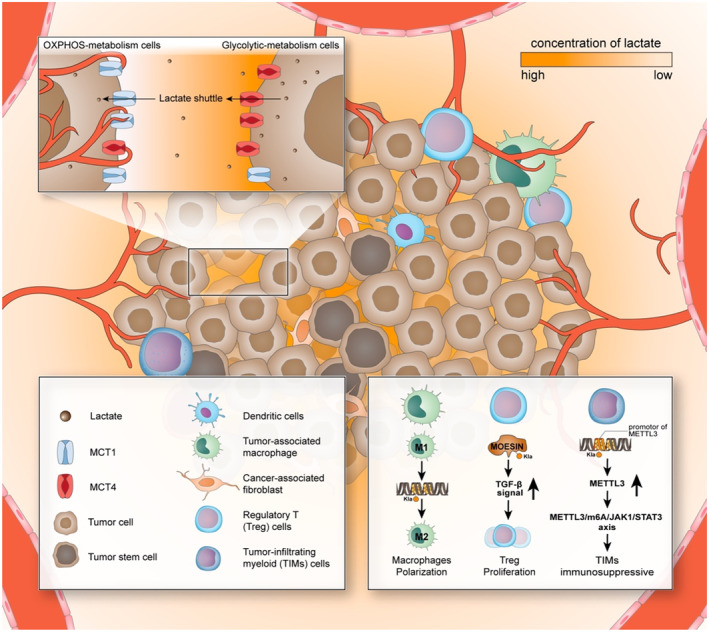FIGURE 1.

Lactate and lactylation shaped the tumour microenvironment. Tumour cells, tumour‐associated immune cells and tumour‐associated fibroblasts together constitute the tumour microenvironment, and some of them have been found to be regulated by lactate. The most hypoxic part of the tumour microenvironment is often in the state of the highest lactate, and the cells in it are metabolized in a glycolysis‐dependent manner, and the expression of MCT4 is increased that enables transportation of more lactate extracellularly. As the oxygen supply improves, the lactate concentration gradient decreases, and the lactate produced by the ‘lactate‐production cells’ diffuses to adjacent cells along with the concentration gradient. These cells metabolize in an OXPHOS‐dependent manner, and their expression of MCT1 increases, enabling more transformation of ‘borrowed’ lactate into the cell and is used to produce energy in a more efficient way. This shift of energy metabolism reprogramming is also one of the important driving forces for the shaping of the tumour microenvironment, where the high lactate state suppresses the immune cells and recruits cells to push around in various ways, and the formation cause of many pro‐tumorigenesis properties of cells is lactylation. Lactylation can increase the expression of M2‐like genes in macrophages and then urges macrophages to switch from pro‐inflammatory phenotype to anti‐inflammatory phenotype. 31 , 71 In Treg cells, lactylation of MOESIN protein can upregulate TGF‐β signalling, thereby promoting the proliferation of Treg cells and enhancing their immunosuppressive effect. 76 In TIM cells, the highly enriched lactylation state at the METTL3 promoter leads to the upregulation of METTL3, which, in turn, exerts their immunosuppressive effect through the METTL3/m6A/JAK1/STAT3 axis. 77 The significantly increased lactate flux in pancreatic cancer has also been shown to be closely related to the formation of cancer‐associated fibroblasts (CAFs), whether this and lactylation plays a role in the development and progression of pancreatic cancer remains to be explored. Moreover, the acidification of the medium reduces the pH within immune cells and inhibits the activity of a variety of immune cells, including T cells, NK cells and dendritic cells, but whether lactylation has an effect on these immune cells is also a question that remains to be explored. 78 In addition, many cells closely related to tumour development in the tumour microenvironment have also been found to be able to receive lactate regulation, among which what role lactylation plays remains to be explored, and the exploration of this problem is a promising research direction that may help further revealing the role of epigenetics in shaping the tumour microenvironment.
